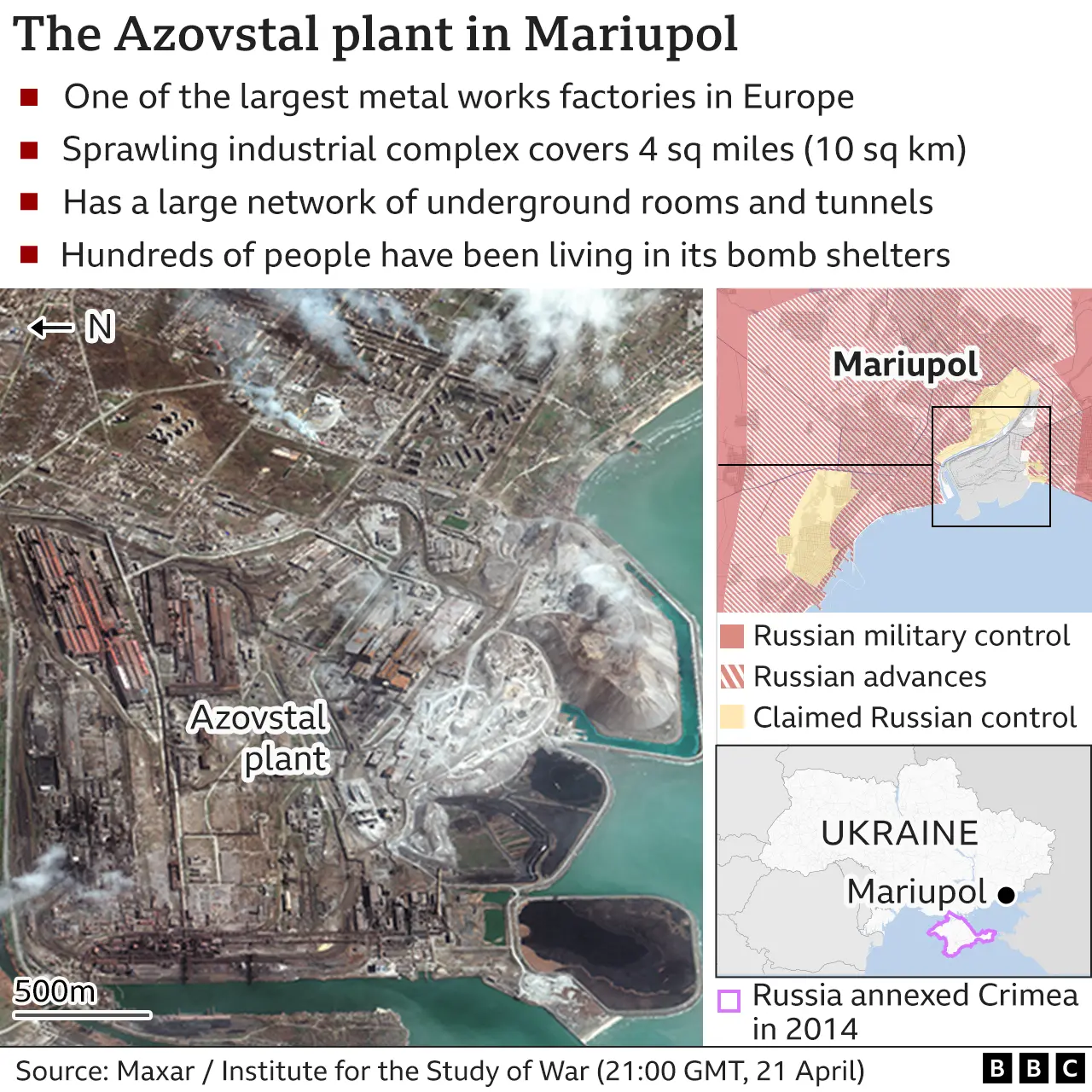Mariupol steelworks: 'We have wounded and dead inside the bunkers'
One of the last Ukrainian defenders in Mariupol has told the BBC that the besieged steelworks where they are holed up is largely destroyed above ground and civilians are trapped under collapsed buildings.
Speaking from the Azovstal plant - the last part of Mariupol not under Russian control - Svyatoslav Palamar from the controversial Azov regiment said defenders had repelled waves of Russian attacks.
"I always say that as long as we are here, Mariupol remains under control of Ukraine," he said.
Earlier President Vladimir Putin called off a planned Russian assault on the steelworks - a maze of tunnels and workshops - and ordered his troops to seal it off instead.
"Block off this industrial area so that a fly cannot pass through," he said.
Much of Mariupol has been destroyed in weeks of heavy Russian bombardment and intense street fighting. Taking the Sea of Azov port is a key Russian war aim and would release more troops to join a Russian offensive in the eastern Donbas region.
Capt Palamar said the Russians had fired on the steel plant from warships and dropped "bunker-busting" bombs on it.
The BBC has not been able to verify any of his account. But it tallies with testimony earlier this week from a Ukrainian marine commander also in the steelworks, who said fighters were outnumbered and running out of supplies.
"All the buildings in the territory of Azovstal are practically destroyed. They drop heavy bombs, bunker-busting bombs which cause huge destruction. We have wounded and dead inside the bunkers. Some civilians remain trapped under the collapsed buildings," Capt Palamar said.
The Azov regiment was originally a far-right group that was later incorporated into Ukraine's National Guard. Its fighters along with a Marine brigade, border guards and police officers are the last Ukrainian defenders left in the city.
When asked how many Ukrainian defenders remained in Mariupol, Capt Palamar answered simply "enough to repel attacks".
He said that civilians were in separate locations away from fighters. They were in basements containing 80-100 people each but it was unclear how many civilians there were in total as some buildings had been destroyed and fighters could not reach them because of shelling. Entrances to some of the bunkers were blocked by heavy concrete slabs that only heavy machinery could move, he said.
"We keep in touch with those civilians who stay in places that we can get to. We know that there are small children there as young as three months old," he said.
The fighter appealed for civilians to be given safe passage out of the steelworks and called for a third country or an international body to act as a guarantor for their safety.
"These people have got through a lot already, through war crimes. They don't trust Russians, and they are scared," he said, adding that they feared torture and murder at the hands of Russian troops or deportation to Russia through so-called filtration camps.
Elderly civilians in the steelworks were in need of medicine while there were also about 500 seriously wounded fighters who were not getting the care they needed - including major surgery such as amputations.
"After 52 days of blockade and heavy fighting we are running of medicines. And then we also keep unburied bodies of our fighters whom we need to bury with dignity in Ukraine-controlled territory," he said.
Capt Palamar said Ukrainian defenders also wanted to secure their own evacuation if possible - but there could be no question of surrender.
"As for surrender in exchange for the safe way out for civilians, I hope we all know whom we are dealing with. We definitely know that all guarantees, all statements of the Russian Federation are worth nothing."


He said many of the defenders left in Azovstal came from Crimea, annexed by Russia in 2014, as well as the eastern Donetsk and Luhansk regions. He himself had been married there and his child had been born there.
"I witnessed how this city was developing. How this city became the pearl of Azov and it's a hometown for me as well," he said.
"Russia is not renewing or rebuilding anything. It aims to destroy and terrorise... If we fall this horde will go further and the whole civilised world will be in danger."
Ukraine has accused Russian forces of bombing civilian shelters and of using weapons banned or restricted by international law - including phosphorus bombs and cluster munitions - in attacks on Azovstal.
Ukraine as well as the US and UK have announced investigations into the possible use of chemical weapons in Mariupol, something Russia has denied. The BBC cannot independently confirm the allegations.

War in Ukraine: More coverage
- EXPLAINED: Why Russia wants eastern Donbas
- IN MAPS: Tracking the invasion
- UKRAINE: Where have millions of refugees gone?
- READ MORE: Full coverage of the crisis


